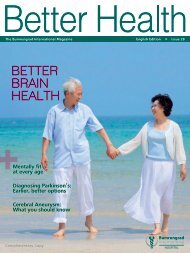Better Health 25 Eng
The magazine for patients and friends of Bumrungrad International Hospital, Thailand.
The magazine for patients and friends of Bumrungrad International Hospital, Thailand.
- TAGS
- bumrungrad
- hospital
- thailand
Create successful ePaper yourself
Turn your PDF publications into a flip-book with our unique Google optimized e-Paper software.
progression. “It’s very important to detect and diagnose<br />
Alzheimer’s disease as early as possible,” says Dr, Ketchai.<br />
“Earlier intervention slows disease progression while <br />
boosting quality of life for patients and caregivers. It <br />
also helps reduce the risk of complications from injury, <br />
infection and the patient becoming unable to conduct <br />
daily activities. The medical community continues working<br />
to develop new medications and potential cures. I believe <br />
the chances are good that those efforts will succeed during <br />
the next five or ten years.”<br />
<br />
The importance of caregivers <br />
Caregivers play such an important role in helping patients<br />
with dementia maintain a quality of life as normal as is<br />
possible. Caregivers make numerous sacrifices for the good<br />
of their patients; their dedication often requires changes to<br />
their schedules and normal daily activities, and the demands<br />
that come with caregiving can cause a great deal of physical,<br />
mental and emotional stress. <br />
“It’s very important that caregivers develop a solid base<br />
of knowledge about dementia. The patient’s doctor can help<br />
prepare the caregiver to know what to expect and how to<br />
Did you know?<br />
Among seniors, some symptoms<br />
of depression can be difficult to<br />
distinguish from symptoms of<br />
dementia. These include memory<br />
loss, confusion and hallucinations.<br />
Neuropsychological testing is used<br />
to diagnose depression.<br />
handle specific problems,” Dr. Ketchai notes.<br />
“More importantly, caregivers must not forget about taking <br />
care of their own health, both physical and mental. Caring <br />
for a dementia patient is never easy, and it can quickly <br />
take a toll on a caregiver’s well-being. “ <br />
Dr. Ketchai continues: “Providing loving care requires <br />
patience and understanding. Remind yourself that the <br />
frustrating symptoms and behaviors you must deal with <br />
are not coming from the patient; they are coming from the <br />
illness. It also helps to divide up the responsibilities; having <br />
at least two caregivers for a patient provides time to rest <br />
and relax. That’s a good thing for caregivers, and for their <br />
patients, too.”<br />
10 Alzheimer’s disease symptoms<br />
you should not ignore<br />
1. Frequent and worrisome forgetfulness<br />
2. Inability to recall recent events<br />
3. Communication difficulties, e.g. inability to use <br />
correct wording that people will comprehend <br />
4. Lost away from home – can’t find the way <br />
back home after going out<br />
5. Dressing improperly or not taking care of <br />
personal hygiene<br />
6. Inability to perform simple math functions<br />
like addition or<br />
subtraction<br />
7. Irrational misplacement of things, e.g.<br />
placing shoes in the refrigerator<br />
8. Unexplained mood swings<br />
9. Rapid changes in personality<br />
10. Rarely responsive or pervasive loss<br />
of interest <br />
17
















